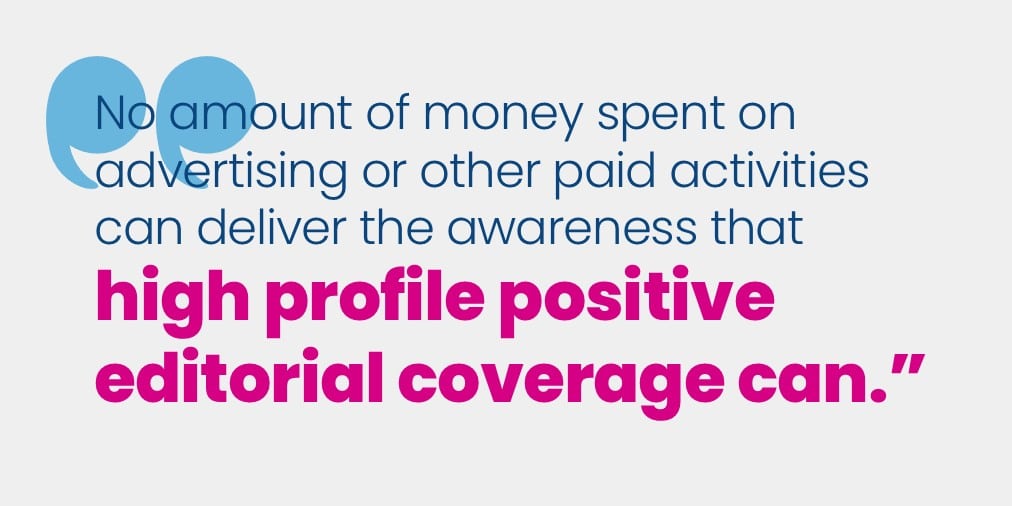Media Relations:
Your people, prominently positioned.
The Lowe Group’s media relations team taps our deep relationships with journalists, editors, producers, podcast hosts and other content creators to consistently deliver quality media outcomes for clients.

Regularly earning successful, commercially impactful outcomes starts with a sophisticated understanding of the financial media: What are that producer’s audience dynamics and competitive imperatives? What motivates this reporter and what are their personal preferences and quirks? Armed with these insights—insights developed over decades spent sitting on both sides of the table—we’ll work with you to tailor your key messages accordingly and craft pitches that land.
The first step in building a successful media relations strategy is developing clear messaging delivered through:
Media
outreach
Media interviews:
print, digital, broadcast
Content
placement
Media
tours
News releases and media advisories

Media Training.
We conduct media training to ensure all spokespeople deliver a unified message that supports the firm’s brand. We help spokespeople prepare for interviews, identify key messages, deliver quotable soundbites and handle difficult questions.
- Message triangle development
- Interview preparation (broadcast, print, online/podcast; in-studio, live/taped show, satellite)
Media Events.
Bringing media together for in-person or virtual events is an important part of our work. Media events can be helpful for announcing major news, sharing research or educating selected media.
We’ve planned news conferences, media webinars, educational seminars and media roundtables for groups large and small. From planning the in-person logistics to creating support materials and coordinating technology, Lowe Group has managed numerous media events for clients, helping them get in front of reporters in a way that leads to news coverage and builds awareness and long-term relationships.
Your frequently asked questions, answered.
What does FurtherFaster mean for Media Relations?
What do financial services professionals need to know?
Media Relations FurtherFaster Proofpoints.
Background
A $500B+ fund manager wanted to break into the ‘niche-ey’ custom SMA/direct indexing conversation, while continuing to broadly raise the profile of its standout investment team.
Scope of work
From the outset, Lowe Group viewed the assignment as two engagements in one. We even gave them code names.
‘Operation Small-Ball’ was about growing intermediary awareness of the client as a custom SMA player through relentless ongoing engagement with key media. We first organized media events for trade press to introduce the client’s capabilities, then hit the conference circuit hard, often arranging one-on-one meetings with reporters who had attended the events.
‘Operation Air Cover,’ on the other hand, entailed growing brand awareness by increasing the number of earned media hits for the investment teams. Here we could be a bit more deliberate, focusing on one strategy and its investment team every few weeks—learning the product, providing media training if needed, then lining up interviews. This was supplemented by regular submitted content placement.
Outcome
Our client is now known in key media as an expert voice on custom SMAs; reporters they invested time getting to know now call us when they are looking for insights. And that business has taken off. On the investment side, the number of awareness-building media hits is up sharply and the bench of media-ready investment pros is much deeper than before.
Background
A venerable fund manager best known for a single niche investment product that was heavily associated with its founder sought to reinvent itself as a diversified alternative investment platform and needed help telling that story to intermedaries.
Scope of work
Our media outreach program to reposition this firm from one-trick pony to multiproduct alternatives juggernaut has leaned heavily on three pillars:
- Our technical understanding of financial markets; we’ve been able to help media understand how the firm’s proficiency in its core product relates to other products it has rolled out
- The client’s vigorous content program; we find solid content to be a differentiator and door opener with reporters and have worked with the client to generate content that the media appreciates
- Transparency into the distribution channel; insights from sales on what products are resonating with intermediaries—and why—has informed our media focus and made it more commercially impactful
Outcome
The manager is no longer viewed as a single product boutique dependent on its founder but, rather, as a dynamic, multiproduct leader across the liquid alternatives space with a deep bench of investment professionals. AUM has grown substantially.
Background
A pioneer in impact investing that had managed a single fund for decades was preparing to roll out its first new funds in years and needed to get the word out. Making matters trickier: an ongoing media backlash in the US against sustainable investing.
Scope of work
We got to work developing messaging for the new funds that made an impassioned case for private impact investment—and specifically our client’s approach—while avoiding taking potshots against public market ESG. We secured regular coverage of the firm’s new funds and we helped amplify that coverage—as well is firm news and website content-on social media.
Outcome
The manager is now perceived as a true multiproduct platform and its leaders are routinely covered with respect to the fund launches and key industry issues.
Read our latest insights on Media Relations.
Morningstar conference regains its mojo
Last year’s kinks worked out, MICUS 2025 delivered good energy, presenters and Exhibit hall.
Earned media: The PR workhorse of visibility for ETFs, other investment products and services
Key takeaways: Earned media includes coverage or attention your firm gets that is not paid Research shows earned media is viewed as more credible than…
AI tools for financial PR, digital marketing: 5 takeaways from Office Hours
ChatGPT, Claude Sonnet 3.7, and Jasper.ai all discussed by Office Hours panelists and guests.


